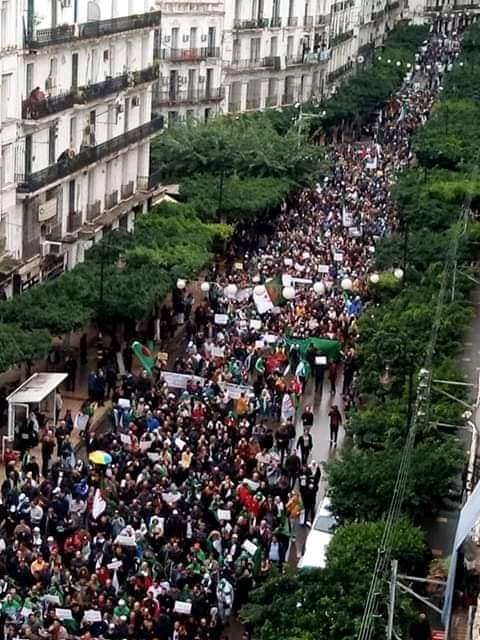LOC11:48
08:48 GMT
 Protests in Algeria calling for cancellation of Presidential election
Protests in Algeria calling for cancellation of Presidential election
KUWAIT, Dec 29 (KUNA) -- Algeria was marred by political uncertainties throughout 2019, and people protested against former President Abdulaziz Bouteflika's bid to run for another term.
Following are major events in Algeria this year.
Jan. 18: Algeria commenced process of presidential polls on April 18 after the end of the current President Abdulaziz Bouteflika's term.
Jan. 28: Algeria's Constitutional Council President, Mourad Medelci, Dies at age of 76.
Feb. 2: Algerian President Bouteflika announced his intention to run for a fifth term in the country's presidential elections set for April 18.
Feb. 10: President Bouteflika appointed Tayeb Belaiz to head Algeria's Constitutional Council Chairman as successor to the late Medelci.
Feb. 22: Algerian Police fired tear gas against anti-Bouteflika protesters.
Feb. 28: Algerian police released journalists detained for protesting against Bouteflika running for a new presidential term.
March 1: Seven protesters and more than 50 officers were injured, with 45 people arrested in anti-Bouteflika protest near the presidential palace in Algeria.
March 2: Algerian president dismissed his campaign director Abdelmalek Salal and appointed Abdulghani Zaalan as new director.
March 5: Algerian protests raised as thousands of people took the streets and the Algerian army vowed to maintain security.
March 6: Algeria's Rally for Culture and Democracy opposition party, Socialist Forces Front, Labor Party, and the Movement for the Society of Peace, announced to boycott the upcoming presidential elections.
March 10: Bouteflika returned to Algeria after two-week treatment in in Geneva.
March 11: more than 1,000 Algerian judges refused to oversee vote if President Bouteflika contests it.
March 11: President Bouteflika postponed the 18 April presidential elections and said he will not seek a fifth term in office.
March 12: Bouteflika dismissed Ahmad Ouahya's government and appointed Noureddine Badawi to form a new government.
March 12: Algeria protests continued after Bouteflika dropped fifth term bid.
March 26: Algerian Army Chief Ahmad Gaid Salah called for the application of Article 102 of the Algerian Constitution to oust President Bouteflika.
April 1: Algerian Prime Minister Noureddine Badawi formed the new government.
April 2: Bouteflika officially resigned as president.
April 3: Algerian Constitutional Council declared that the presidential post has become vacant.
April 9: The Algerian parliament called the President of the National Assembly Abdelkader Ben Saleh as president for a transitional period of 90 days.
June 2: Algerian Constitutional Council canceled the presidential election, which was scheduled to be held on July 4.
June 6: Algeria's interim president Abdelkader Bensaleh called all parties for political talk to prelude for the presidential elections.
July 19: Algerian football team won the Africa Cup of Nations.
Aug. 17: Algerian protesters Stormed National Commission for Dialogue and Mediation demanding dismissal of the government.
Sept. 20: protests continued in Algeria for the 31st Friday.
Sept. 25: A military court in Algeria sentenced Said Bouteflika, the younger brother of former president Bouteflika, to 15 years in prison for plotting against the state and undermining the army.
Nov. 1: Thousands of Algerians took to the street marking the 65th anniversary of independence war, announcing their refusal to presidential elections, due in December 22.
Nov. 2: Independent electoral commission announced names of presidential candidates.
Nov. 16: Five Presidential candidates signed a code of ethics for their campaigns.
Nov. 28: European Parliament approved resolution that condemned human rights violations and arbitrary arrests of journalists, unionists, lawyers and students who were calling for respect of human rights.
Nov. 28: Algeria condemned the European Parliament's resolution and considered it an interference in the country's internal affairs.
Dec. 1: Algerian government submitted a motion to the parliament to discuss anew the French colonization and demanding compensations for crimes committed by the French occupation, 10 years after closure of the very file.
Dec. 6: Algerians held their last protest before presidential elections, and candidates participated in a TV debate.
Dec. 7: Week-long presidential elections began.
Dec. 8: Algeria's largest Islamic party, the movement of peaceful community, announced boycott of elections, and labor unions called for nationwide four-day strike in a show of rejection of elections.
Dec. 10: A court sentenced former Prime Ministers, Ahmad Oyahya for 15 years, Abdulmalek Sallal for 12 years and Yusuf Yusufi for 10 years for crimes committed while they were in office.
Dec. 13: Electoral commission announced victory of Abdulmajid Tabboune in presidential elections, winning 58.15 percent of votes, while tens of thousands took to streets to protest against the winner.
Dec. 14: Tabboune, in an address to the nation, pledged to unite the Algerians, empower youth and write a new constitution.
Dec. 23: Deputy Defense Minister and Chief of Staff of the Algerian Army Guyed Saleh passed away at age 80. (end)
eng